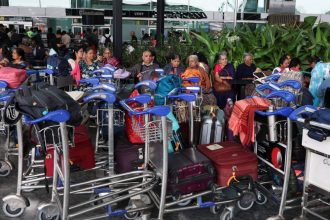The Rafah border crossing between Gaza and Egypt will remain closed until further notice, Israeli Prime Minister Benjamin Netanyahu announced yesterday. He stated that reopening would depend on Hamas handing over the bodies of deceased hostages, as both sides continue to exchange accusations over ceasefire violations.
The statement followed reports from the Palestinian embassy in Egypt that Rafah — Gaza’s main gateway to the outside world — was expected to reopen for entry tomorrow. However, Netanyahu’s declaration has now thrown that plan into uncertainty.
For several days, both Israel and Hamas have traded blame for breaking the US-mediated ceasefire. In Washington, the US State Department said it had received “credible reports” suggesting Hamas might violate the agreement. “Should Hamas proceed with this attack, measures will be taken to protect the people of Gaza and preserve the integrity of the ceasefire,” it added, without elaborating.
Meanwhile, former US President Donald Trump indicated that he would consider allowing Israel to resume its military operations in Gaza if Hamas failed to uphold its side of the deal.
Hamas responded sharply, accusing Netanyahu of “a blatant violation of the ceasefire agreement and a repudiation of commitments made to mediators.” It added that keeping Rafah closed would block the delivery of critical equipment needed to recover the remains of hostages, slowing down the humanitarian process.
Israel confirmed it had received two more bodies late yesterday, bringing the total to 12 out of 28 expected under the US-brokered ceasefire deal. The agreement, reached last week, saw Hamas release 20 living Israeli hostages in exchange for the freedom of nearly 2,000 Palestinian detainees.
Yet, despite these steps, formidable challenges remain. The humanitarian crisis in Gaza deepens daily — with mass displacement, famine conditions, and overwhelmed health systems. Both sides accuse the other of stalling the return of bodies and obstructing aid shipments.
According to the UN World Food Programme, roughly 560 metric tons of food have entered Gaza each day since the truce began — still far short of the massive need. The Rafah crossing, closed since May 2024, remains a symbol of the ongoing suffering and political deadlock.
Trump’s 20-point plan to end the war — including disarmament, the governance of Gaza, and the creation of a Palestinian state — faces immense obstacles. Trust remains fragile, and each delay or disagreement threatens to unravel progress.
In the end, beyond the politics and power struggles, what’s truly at stake are lives — ordinary people caught in the crossfire, families yearning for peace, and children who deserve a world where borders open for hope, not conflict.








